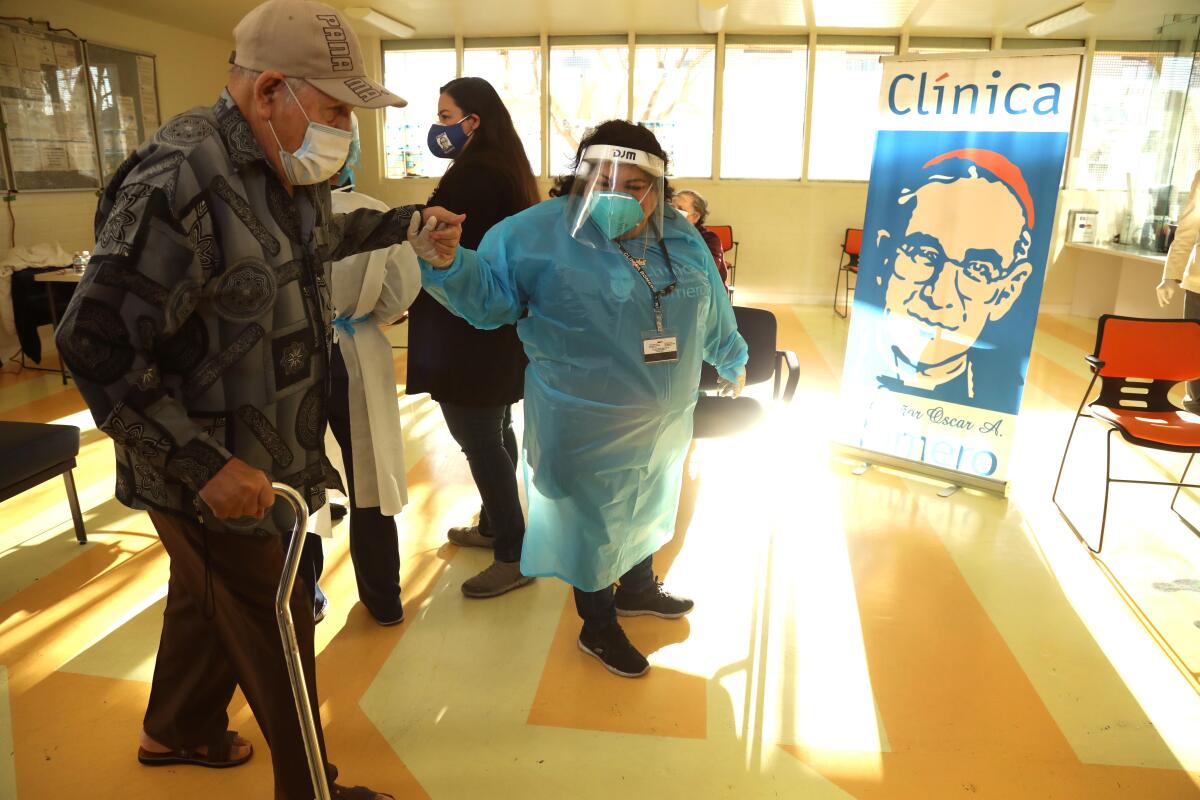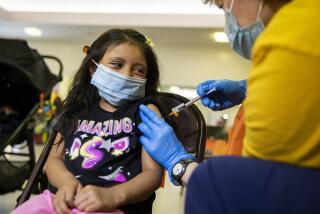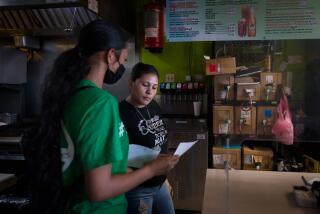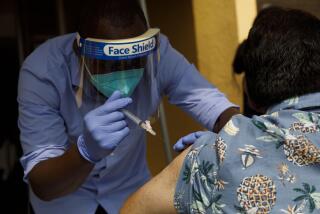Column: Vaccine hesitancy among younger Latinos threatens our elders. Protect abuelita at Christmas

Younger Latinos owe it to our elders to be fully vaccinated and boosted against COVID this winter — or skip the matriarch’s “Nochebuena” party on Christmas Eve and other family gatherings.
But as Omicron races through our society, multiplying 70 times faster than Delta, there’s a dangerous gap in vaccination rates for Latinos under 50 compared with rates for older Latinos — a gap that’s bigger than in any other ethnic group in Los Angeles County. The age disparity, which applies especially to Latinx millennials and their children, could deepen the pandemic’s already-disproportionate toll on our families as breakthrough cases become the norm.
Latinos, who often live in multigenerational households, should err on the side of caution in the face of a mutating virus. We shouldn’t gamble with the lives of our elders who’ve sacrificed so much for us.
Opinion Columnist
Jean Guerrero
Jean Guerrero is the author, most recently, of “Hatemonger: Stephen Miller, Donald Trump and the White Nationalist Agenda.”
Too many Latinx millennials and Gen Z mistakenly believe that if our abuelitos and older parents are vaccinated, they’re safe, and younger people around them can forgo the jab. But while the vaccine lowers a person’s chances of serious illness or death, it isn’t bulletproof. Unvaccinated people can still serve as vehicles for COVID to infect and endanger vaccinated relatives.
Moreover, young Latinos are vulnerable, too. In California, Latinos ages 20 to 54 have died from COVID at a rate more than eight times higher than that of white people of those ages. Even though Latinos nationwide are outpacing white people in getting vaccinated, the opposite is true in Los Angeles — a trend driven by younger Latinos.
County data show about 87% of Latinos age 65 and older have received at least one dose of the vaccine, nearly the same as whites and Asians in that age group. But among Latinos in our 30s and 40s, only 65% have received a dose. For Latinos ages 18 to 29, the rate drops to 60%.
Latinx children ages 5 to 11 are the least likely of all eligible children to have received a dose. That means Latinx millennials, who lag behind their parents in vaccinations, are not vaccinating their kids, even as many of them enlist their vulnerable parents for childcare.
We as a community will never escape the deadly toll of this virus until we all embrace the vaccine. For months, I’ve tried and failed to convince my anti-vaccine relatives to get the jab for the sake of older family members like my mother, who has an autoimmune disorder that heightens her risk.
Many other Latinos are grappling with similar concerns over relatives in regular contact with the unvaccinated. A 32-year-old labor organizer who spoke on condition of anonymity about her relatives’ vaccination refusal told me she feels helpless, as her job skills have not translated on this front: “The hardest people to organize is your family.”
Part of the problem is the intractability of disinformation. Young Latinos are more likely to get news from social media platforms such as Facebook and TikTok, plagued by COVID disinformation targeting Latinos.
But it’s more than that. Jonathan Garcia, Oregon State University’s global health program director, told me systemic racism plays a part.
Research shows second-generation Mexican immigrants often experience worse health outcomes than the first generation because of higher degrees of discrimination. While the first generation is somewhat protected in cultural enclaves, their descendants tend not to be, and discriminatory experiences can discourage people from trusting the health system. Many are predisposed to be suspicious of the government or fear being used as “guinea pigs” for vaccines.
Garcia says it’s important to not jump to conclusions about unvaccinated youths. “We continuously blame people for health behaviors,” he said, “rather than looking at the underlying root causes of health disparities.”
A January study by the Kaiser Family Foundation found younger Latino adults were “less trusting than their older counterparts of government officials” regarding vaccine information. They were also less likely to see vaccination as a “collective responsibility” than their elders, with half seeing it instead as a “personal choice.”
Anita Sreedhar and Anand Gopal wrote in the New York Times recently that when the government fails people, there occurs “an erosion of the idea of a common good.” The erosion has historically coincided with cuts to social services, as in the Reagan era.
“Politicians insisted that it’s no longer the government’s job to ensure people’s well-being; instead, Americans were to be responsible only for themselves and their own bodies,” they wrote. With that message, “ideas of social solidarity and mutual obligation” lost their force.
This withdrawal from engagement is not true for all young Latinos. Angela A. Gonzales, professor of justice and social equity at Arizona State University, has been studying how youths of different ethnicities see the vaccine. Her preliminary analysis shows many Latinx youth are “collectivistic,” seeing vaccination as familial duty. “For others, though, it’s almost the opposite: resistance to government intervention and suspicion about having to provide personal information,” she told me.
Many who reject the vaccination care a lot about family, argues Victor Rios, professor of Latino sociology at UC Santa Barbara. They just haven’t internalized the message that getting vaccinated is necessary to protect others, too. That might require engaging the right messengers, such as popular artists. “We’re missing communication to the younger generation as a society because we’re not being culturally responsible,” he told me.
Politicians and family members may not be the best messengers. But the message, Rios said, does resonate: “Take care of your community and your family by taking care of yourself, by getting that vaccine.”
It’s the best Christmas present we can give our families. Protect abuelita.
More to Read
A cure for the common opinion
Get thought-provoking perspectives with our weekly newsletter.
You may occasionally receive promotional content from the Los Angeles Times.












